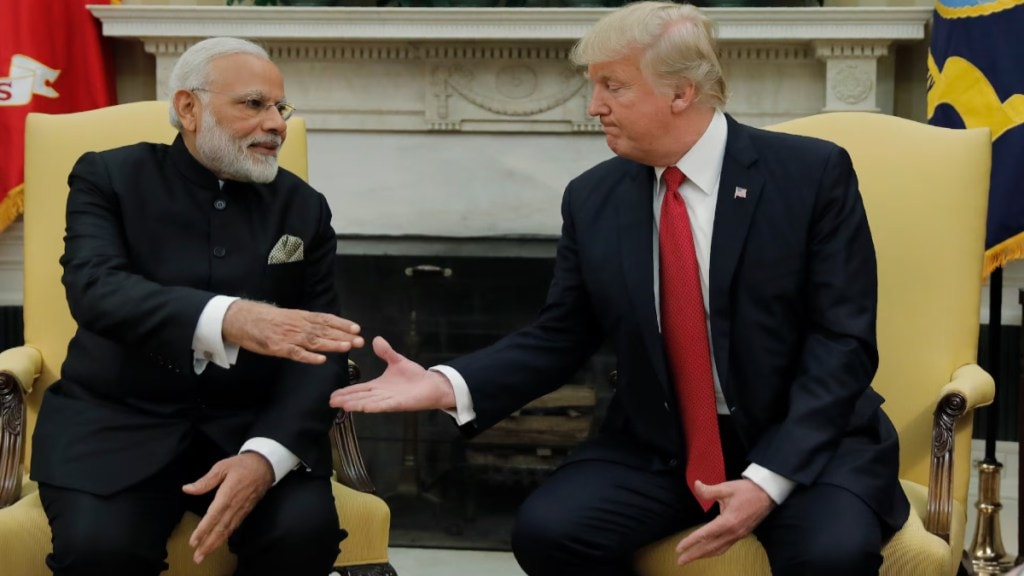India-US ties: The relationship between Prime Minister Narendra Modi and US President Donald Trump entered a new phase of cautious reconciliation on Tuesday after weeks of silence and rising tensions. On September 16, 2025, President Trump phoned Prime Minister Modi to extend birthday greetings ahead of his 75th birthday.
The exchange, which Modi described as a “warm conversation” with “my friend,” marked their first direct interaction since trade dispute strained ties earlier this year.
What Modi-Trump call signify?
The call was not merely ceremonial. It came against the backdrop of heightened India-US tensions following Washington’s imposition of a 50 per cent tariff on Indian imports in response to New Delhi’s continued purchase of discounted Russian oil. The Russia-Ukraine war and tariff had become a major irritant, leading to a suspension of bilateral trade talks. Modi’s decision to accept Trump’s call, after weeks of avoiding communication, is seen as a carefully calibrated move to signal readiness for a reset.
Modi also reiterated India’s support for diplomatic efforts to resolve the Russia-Ukraine conflict. In a post on X, he wrote, “Thank you, my friend, President Trump, for your phone call and warm greetings on my 75th birthday. Like you, I am also fully committed to taking the India-US Comprehensive and Global Partnership to new heights.”
Trump thanked ‘friend’ PM Modi, for ending the Russia-Ukraine war. His post on Truth Social reads, “Just had a wonderful phone call with my friend, Prime Minister Narendra Modi. I wished him a very Happy Birthday! He is doing a tremendous job. Narendra: Thank you for your support on ending the War between Russia and Ukraine!,” President Donald Trump after talking to Modi.
India-US trade talks resume
The conciliatory tone coincides with the resumption of India-US trade talks in New Delhi earlier this month. Indian officials, led by Commerce Ministry Special Secretary Rajesh Agrawal, met with a US delegation headed by Assistant US Trade Representative Brendan Lynch. The discussions aimed to map a roadmap for resolving disputes relating to agricultural imports, dairy access, and commodity tariffs, while also exploring the possibility of reviving negotiations towards a long-discussed Bilateral Trade Agreement (BTA).
For Washington, reducing India’s reliance on Russian energy imports remains a priority. For New Delhi, securing relief from punitive tariffs and protecting strategic autonomy form the cornerstone of its negotiating position. The birthday call may create political space for both sides to pursue compromise without appearing to back down.
Modi’s refusal of Trump’s calls in August
The thaw follows weeks of frosty silence. According to reports in Germany’s Frankfurter Allgemeine Zeitung and Japan’s Nikkei Asia, Modi pointedly refused at least four phone calls from Trump in August 2025. The refusals, viewed as an extraordinary diplomatic snub, reflected New Delhi’s anger at punitive tariffs and concerns that Trump might misrepresent the substance of conversations in public.
The New York Times added that Modi’s office was also worried Trump could misuse a conversation for political theatre, particularly by staging a photo opportunity with Pakistan’s military leadership, something India viewed as diplomatically unacceptable. Officials were further infuriated when Trump boasted publicly that he had “solved” India-Pakistan tensions and even suggested he deserved a Nobel Peace Prize, a claim New Delhi dismissed as baseless.
By accepting Trump’s latest call, Modi appears to be signalling a willingness to re-engage without conceding ground. The call also offered an opportunity for Modi to publicly project India’s agency in managing its most important external relationship, especially in an election season in the US where India-US ties are likely to feature prominently in Trump’s campaign narrative.
Meanwhile, as tensions remain unresolved, the personal outreach carries weight. It shows that despite trade disputes and clashing strategic interests, neither side wishes to let relations deteriorate beyond repair.

